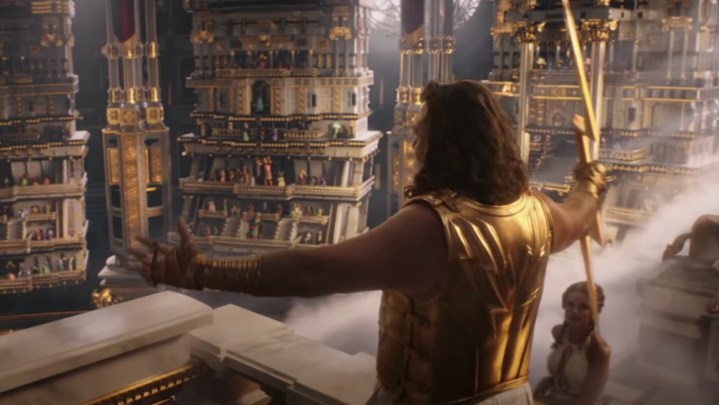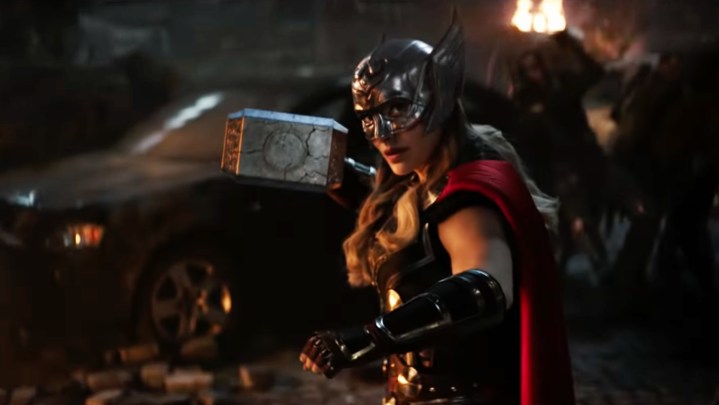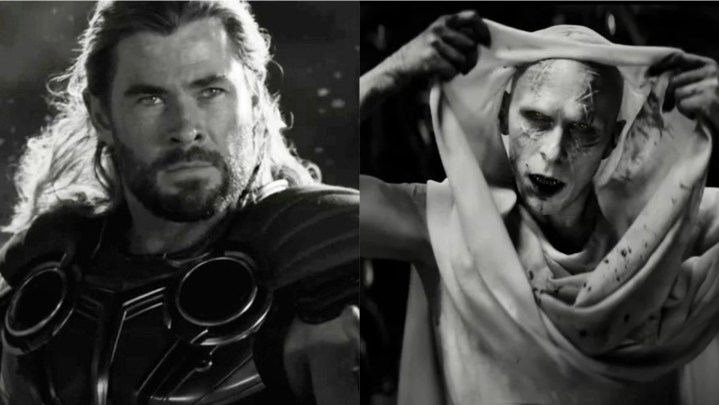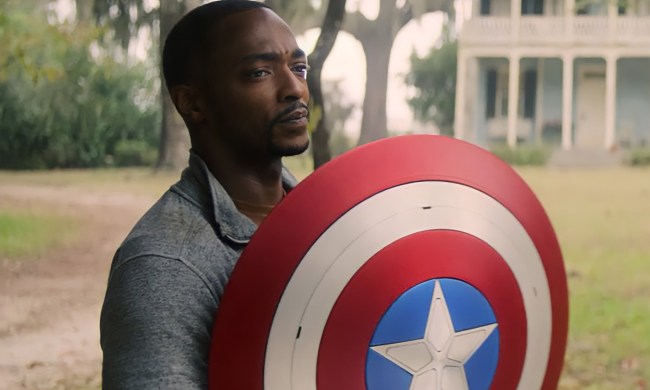After a string of delays, Marvel Studios’ fourth entry and director Taika Waititi’s (Jojo Rabbit) follow-up to Ragnarok is finally in theaters and has continued some predictable storylines along with some ambitious directions for Thor: Love and Thunder‘s characters. Love and Thunder branched out into the wider Greek mythology pantheon with Zeus, which ended by leaning into what could be another Avengers-level threat.
And, as many would have expected, Natalie Portman’s literal and figurative heroic return to the Marvel Cinematic Universe led to some potentially exciting implications in the future. Post-credit scenes aside, though, even the touching finale to Thor’s story in the movie helps vaguely chart out several paths for future movies.
Note: The rest of this story contains major spoilers for Disney and Marvel Studios’ Thor: Love and Thunder.
Gods vs. Heroes

Christian Bale’s surprise return to the comic book/superhero genre since his days in Christopher Nolan’s The Dark Knight Trilogy saw him go the opposite direction by becoming a villain. However, Russell Crowe’s brief portrayal of Zeus led to some major implications beyond this movie in Love and Thunder‘s first post-credit scene.
Like in Greek mythology — but in a certainly more toned-down depiction — Zeus is portrayed in the MCU as an egomaniac that’s long since abandoned the idea of being a god for the people, serving as an indirect manifestation of Gorr, the God Butcher’s grim bloody motives. Love and Thunder shockingly glossed over Thor (supposedly) killing him on his home turf of Omnipotence City.
For better and worse, though, the post-credit scene suggested in Marvel fashion that this will be a major plot point for another day, as Zeus heals from his wounds and sends his son Hercules after the God of Thunder. The Marvel Comics iteration of Zeus isn’t an outright villain, but he has clashed with Thor before. And perhaps not-so-coincidentally, Thor has also butted heads with Hercules in the comics in Journey into Mystery Annual #1 — which Zeus himself broke up and had them make amends.
What’s more telling, though, is Zeus’ bitter dialogue in Love and Thunder, bemoaning the pantheon’s falling status in popularity in favor of the MCU’s sprawling cast of superheroes. Another Avengers movie is an inevitability considering the breakneck speed that Marvel projects are releasing nowadays, and while the central conflict of this eventual movie is anyone’s guess, the prospect of Zeus waging war against superheroes seems something that could qualify as an Avengers-level threat.
At the very least, though, Zeus, Hercules, and other mythological gods could serve as the main antagonists in a fifth Thor movie that also works as a crossover event akin to Captain America: Civil War.
Jane Foster, Valkyrie

As talented and high-profile an actress as Natalie Portman is, her first two appearances in the MCU only used her character as a shallow love interest. That made expectations high for her return in Love and Thunder and an equally big selling point for this fourth entry — and potentially more so should her ties to the Valkyrie be fulfilled.
Jane Foster returns as Mighty Thor, taking a page from Marvel Comics lore. The movie most notably borrows from Jason Aaron’s run on the Mighty Thor comic book series, where Jane fills in the superhero mantle in Thor Odinson’s absence while she struggles with cancer.
Love and Thunder doubled down on the relentless humor from Ragnarok, but the ending took a surprisingly poignant direction by letting Jane ultimately succumb to her cancer at the end of their battle with Gorr — also adapting an element from Aaron’s comic. Yet the second post-credit scene suggested that this won’t be the last time we see Jane Foster in action in the MCU.
After serving admirably as Mighty Thor, she finds herself in the afterlife of Valhalla where she’s greeted by none other than Heimdall, who was killed by Thanos in Avengers: Infinity War. It remains to be seen if a potential resurrection (of sorts) would be handled tastefully and not undo the emotional weight of her death, but the comic book storyline turning her into Valkyrie seems like the most apparent next step should Portman choose to stick around for another few years or so.
A Valkyrie MCU project could theoretically be done as a movie or a Disney+ TV series, especially for the streamer since that platform seems to be the most favored place for adapting lesser-known characters. Portman’s star power and the MCU brand could be argued as being more than enough to carry a blockbuster movie, but either way, such a project could also pave the way for her and Tessa Thompson’s Valkyrie to co-lead.
That’s not something that would be farfetched for Marvel Studios, with Ant-Man and the Wasp and the upcoming The Marvels functioning as half-solo, half-crossover events.
The future of Love and Thunder

The next best part of Thor: Love and Thunder‘s finale was the conclusion to Gorr’s — admittedly brief — character arc and how it came full circle with Thor himself. Bale’s character was tantalizing whenever he was on screen and it’s a shame he was as underused as he was, but using his first and only wish to give his daughter a second chance was a fitting close.
Even more so was Thor taking the aptly named Love in as his adoptive daughter, with a sweet curtain call on this new thunderous duo. Love, however, is somewhat of an original character made for this movie although technically Thor does have a daughter in the comics.
That’s to say, he does, but in an alternate timeline where Ultron defeated the Avengers and Thor’s daughter — Torunn Thorsdóttir — is raised by Tony Stark. Cleverly enough, though, her name in the comics translates to “Thor’s love.”
It’s a creative way of blending originality with source materials, and it seems like a future storyline involving her as a full-grown hero is something Marvel Studios is keeping in their back pocket. As much fun as Chris Hemsworth seems to be having while playing Thor, it’s a matter of time before there would need to be a successor.
Marvel Studios’ Thor: Love and Thunder is now playing in theaters.



